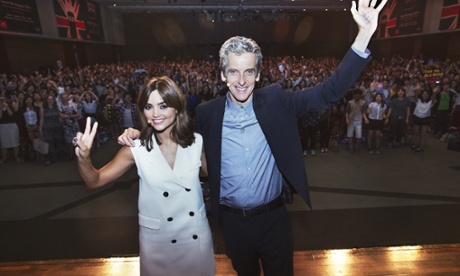
It was federal Nationals MP George Christensen, an avowed Doctor Who fan, who launched a 2012 campaign “to get the Tardis to materialise on Australian soil”. Christensen presented a motion to parliament in 2013, hoping to convince the ABC and film funding bodies to support an Australian season of the long-running BBC series. He was backed by MPs ranging from Dr Andrew Leigh (Labor, economist, academic, textbook geek) to Alex Hawke (Liberal, Hillsong member, accused “right-wing extremist”). Even political foes join forces for Doctor Who.
For now, it seems, the BBC is willing to meet them half way. Doctor Who is coming to Sydney on Tuesday as part of a seven-stop world tour. Fans have forked out upwards of $100 to attend a sold-out Q&A with actors Peter Capaldi and Jenna Coleman, as they fly through five continents to promote the upcoming (34th) season of the series.
Frankly, this visit is the least they can do. In January 1965, New Zealand and Australia were the first nations outside the UK to show the series. Yet the Doctor has only visited Australia once on-screen, in the 1967 adventure The Enemy of the World, with the British seaside unconvincingly cast as an Australian beach. Yet recently the show has filmed (and set) episodes in America, where Doctor Who is finally becoming a household name.
Australia, despite decades of loyalty, has been taken for granted. The series has given a few nods to Australia – notably in the 1980s, when Tegan (played by Brisbane-born Janet Fielding) became the Doctor’s first female assistant who was neither English nor an alien with an English accent. Though the name is actually Welsh, many Australian girls were named in her honour. If you ever meet a woman called Tegan, aged around 30, ask her: “Were your parents Doctor Who fans?”
The most significant Aussie connection, however, lies in perhaps the most famous piece of music ever written by an Australian composer. The Doctor Who theme tune has probably been heard more than anything by Percy Grainger, the late Peter Sculthorpe, or even (for now, at least) Sia’s ubiquitous hit song Chandelier. The theme was composed by Ron Grainer, a child prodigy. Born in the Queensland mining town of Atherton, Grainer studies in Sydney under Sir Eugene Goossens. In 1952, at age 30, he moved in Britain to further his career.
You can probably hum a few Grainer tunes. The unmistakable openings to Steptoe and Son, Maigret, That Was the Week that Was (to Caryl Brahms’ ever-changing lyrics), Comedy Playhouse and Tales of the Unexpected were all his work. His themes could be discordant and experimental (The Prisoner – Patrick McGoohan’s head-trippy spy thriller, not the Aussie prison soapie), light and whimsical (the sitcom Shelley), or toe-tappingly nostalgic (The Jazz Age).
But Doctor Who overshadows them all – not just because of its fame, but because it was mixed by the BBC Radiophonic Workshop’s Delia Derbyshire, who transformed it into an early masterpiece of electronic music. “There are no instruments at all in the original Doctor Who [theme],” recalled her assistant Dick Mills, “not even synthesisers because they hadn’t been invented yet. It was done literally by choosing frequencies, recording them the right length, and sticking all the separate notes together.”
The Doctor Who Experience in Cardiff pays tribute to Derbyshire, while practically ignoring Grainer, except to credit them both. Derbyshire was never officially credited on the show, despite Grainer’s best attempts. But for all of her genius, giving her all the glory is like crediting George Martin for all those timeless Lennon-McCartney songs.
Grainer’s eerie melody has always been wonderful – even when the Derbyshire mix was replaced, even when played by an orchestra at the BBC’s popular Doctor Who at the Proms concert. Even the kitsch version by Eric Winstone and his Orchestra sounded passable, as did the dance single by the disco group Mankind, and Keff McCulloch’s new-age, Latin beat. (OK, not so much that one.) Mark Ayres, composer on the current Doctor Who series, describes it as “a piece of sixties wonder … just one of those tunes that lives on.”
And it gives Grainer an impressive claim to fame: the only person whose contribution is obvious in all 786 episodes of Doctor Who. In case that’s not enough reason to move production to Australia, Grainer wasn’t the only Australian who helped to develop Doctor Who. The initial script was churned out by Australian playwright Cecil Edwin “Bunny” Webber. According to one producer, Webber was too accomplished to “write down to the level required” so his script was replaced by one from another BBC staffer, Melbourne-born Anthony Coburn (who went on to produce Warship and Poldark). According to production notes, Coburn worked closely with Webber, so the first episodes of Doctor Who were written by two Aussies.
Neither Grainer nor the writers were around to celebrate the show’s 50th anniversary in 2013 – or even its 20th. Webber died in 1969, Coburn in 1977 and Grainer died of spinal cancer on 21 February 1981, aged just 58.
For now, Australians will have to be happy that Sydney is part of the whistle-stop Doctor Who tour, which also hits up Mexico City, even though no Mexican seems to have ever done anything for Doctor Who. And spare a thought for Canada. Doctor Who was created by a Canadian, then BBC head of drama Sydney Newman, and the series premiered in Canada just weeks after its Australian debut. Canada’s longest-running fan club was established in 1980. Yet if those fans want to see the world tour, they will have to fly to New York. Are there no Doctor Who fans in Canadian parliament?
• This article was amended on 11 August. New Zealand was the first nation outside the UK to screen Doctor Who, not Australia as suggested. And Tegan was the first female non-English assistant.

